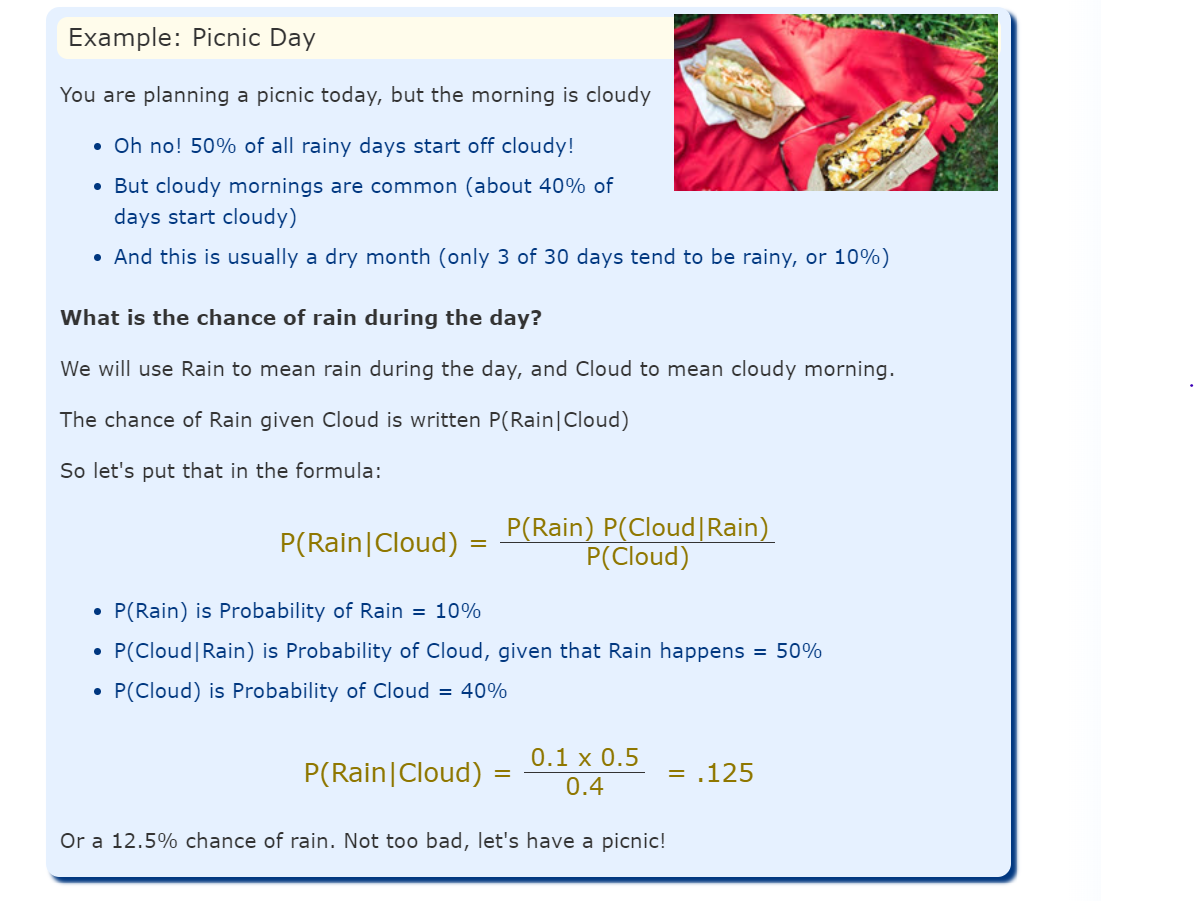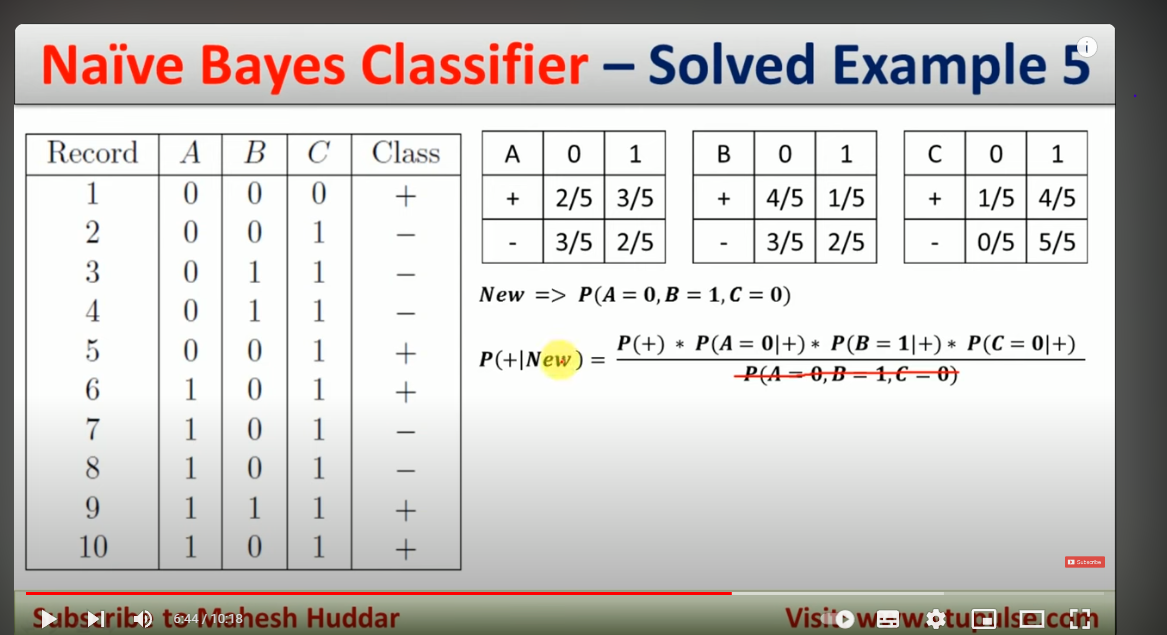Can values for X,y be categroical ? Encoding Categorical Variables
BernoulliNB()
Why Naive Bayes?;;Order doesn’t matter, features are independent. Treated it as a Bag of words. Which simplifies the above equation.
Want to use this in classifiers for ML Want to understand: Multinomial Naive bayes classifer There is also: Gaussian Naive Bayes
Issues
To avoid having 0 probability sometimes they add counts to do this.
Links:
https://youtu.be/PPeaRc-r1OI?t=169
Formula
Think of the line as “given”.
Examples
Example 1

Example 2
In the formula above P(A) is P(+), P(B)=P(NEW)
P(B|A) = P(A=0|+)*… *P(C=0|+)
P(A=0,B=1,C=0) is the same for both + and - class so remove.

Example Car accidents
What’s the probability of car having an accident given that driver is driving in summer, there is no rain, it’s a night and it’s an urban area?
Mock data:
| Season | Weather | Daytime | Area | Did Accident Occur? |
|---|---|---|---|---|
| Summer | No-Raining | Night | Urban | No |
| Summer | No-Raining | Day | Urban | No |
| Summer | Raining | Night | Rural | No |
| Summer | Raining | Night | Urban | Yes |
| Summer | Raining | Day | Urban | No |
| Summer | Raining | Night | Rural | No |
| Winter | Raining | Night | Urban | Yes |
| Winter | Raining | Night | Urban | Yes |
| Winter | Raining | Night | Rural | Yes |
| Winter | No-Raining | Night | Rural | No |
| Winter | No-Raining | Night | Urban | No |
| Winter | No-Raining | Day | Urban | Yes |
| Spring | No-Raining | Night | Rural | Yes |
| Spring | No-Raining | Day | Rural | Yes |
| Spring | Raining | Night | Urban | No |
| Spring | Raining | Day | No | No |
| Spring | No-Raining | Night | Urban | No |
| Autumn | Raining | Night | Urban | Yes |
| Autumn | Raining | Day | Rural | Yes |
| Autumn | No-Raining | Night | Urban | No |
| Autumn | No-Raining | Day | Rural | No |
| Autumn | No-Raining | Day | Urban | No |
| Autumn | Raining | Day | Yes | No |
| Autumn | Raining | Night | Yes | No |
| Autumn | No-Raining | Night | No | No |
To handle data like this it is possible to calculate frequencies for each case:
0. Accident probability
1. Season probability
Frequency table:
| Season | Accident | No Accident | |
|---|---|---|---|
| Spring | 2/9 | 3/16 | 5/25 |
| Summer | 1/9 | 5/16 | 6/25 |
| Autumn | 2/9 | 6/16 | 8/25 |
| Winter | 4/9 | 2/16 | 6/25 |
| 9/25 | 16/25 |
Probabilities based on table:
2. Weather probability
Frequency table:
| Accident | No Accident | ||
|---|---|---|---|
| Raining | 6/9 | 7/16 | 13/25 |
| No-Raining | 3/9 | 9/16 | 12/25 |
| 9/25 | 16/25 |
Probabilities based on table:
3. Daytime probability
Frequency table:
| Accident | No Accident | ||
|---|---|---|---|
| Day | 3/9 | 6/16 | 9/25 |
| Night | 6/9 | 10/16 | 16/25 |
| 9/25 | 16/25 |
Probabilities based on table:
4. Area probability
Frequency table:
| Accident | No Accident | ||
|---|---|---|---|
| Urban Area | 5/9 | 8/16 | 13/25 |
| Rural Area | 4/9 | 8/16 | 12/25 |
| 9/25 | 16/25 |
Probabilities based on table:
Assemble:
Calculating probablity of car accident occuring in summer, when there is no rain and during night, in urban area.
Where B equals to:
- Season: Summer
- Weather: No-Raining
- Daytime: Night
- Area: Urban
Where A equals to:
- Accident
Using Naive Bayes:
What is the Bayes theorem?;; The formula is P(A|B) = P(B|A) * P(A) / P(B).
What are the main advantages of Naive Bayes, and when is it commonly used?;; simplicity, quick implementation, and scalability, used in text classification.
**When using Naive Bayes with numerical variables, what condition is assumed on the data?;; Naive Bayes assumes that numerical variables follow a normal distribution.
How does Naive Bayes perform with categorical variables? makes no assumptions about the data distribution.
What is Naive Bayes, and why is it called “naive”?;; Algo which uses Bayes theorem, used for classification problems. It is “naive” because it assumes that predictor variables are independent, which may not be the case in reality. The algorithm calculates the probability of an item belonging to each possible class and chooses the class with the highest probability as the output.
Naive Bayes Naive Bayes classifiers are based on Bayes’ theorem and assume that the features are conditionally independent given the class label.
- A probabilistic classifier based on Bayes’ theorem.
- Simple and fast, especially effective for text classification.